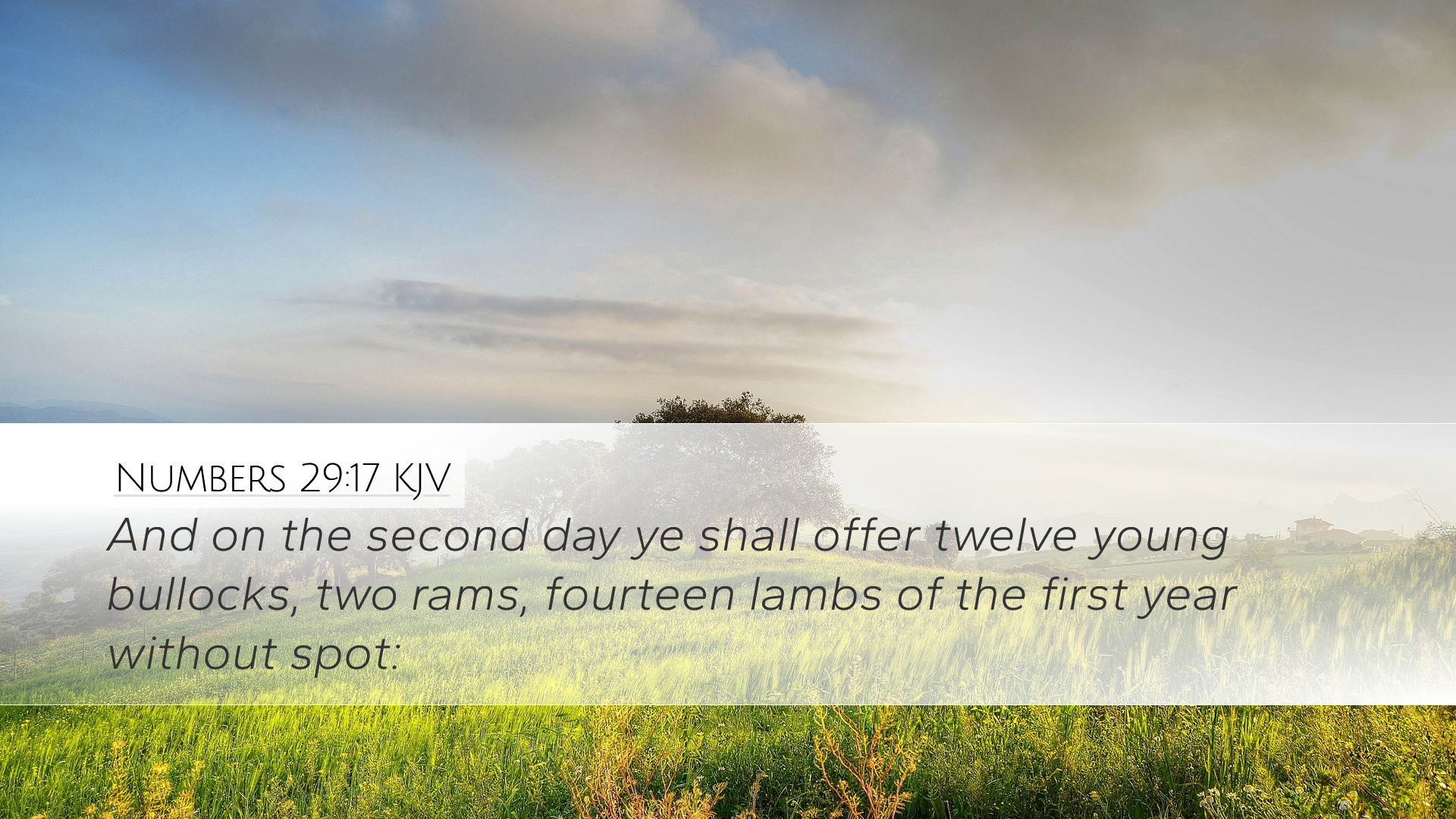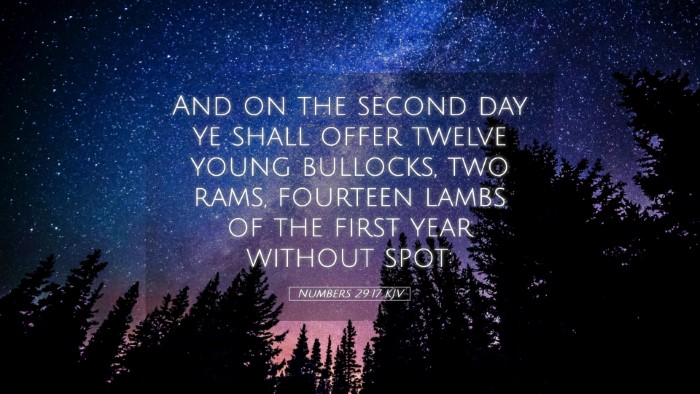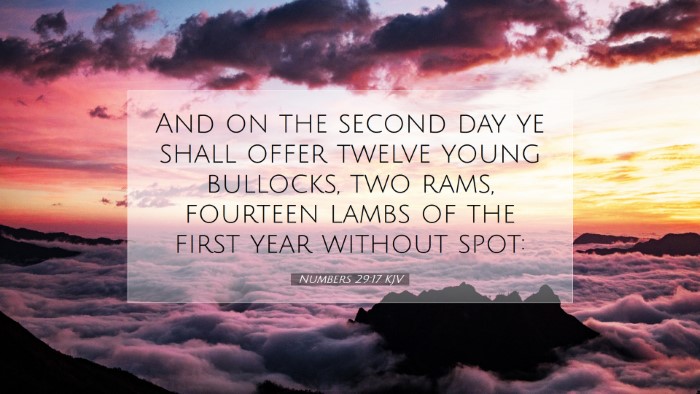Commentary on Numbers 29:17
Numbers 29:17 states: "And on the second day ye shall offer twelve young bullocks, two rams, fourteen lambs of the first year without spot." This verse is part of the provisions for the offerings during the Feast of Tabernacles, emphasizing both the quantity and the quality of the sacrifices required. Below, we will explore insights drawn from esteemed public domain commentaries to provide a comprehensive theological reflection on this passage.
General Context
The Book of Numbers presents the Israelites' journey through the wilderness toward the Promised Land. The focus during these chapters is largely on the laws governing offerings and festivals that maintain a covenant relationship with God.
Matthew Henry's Insights
Matthew Henry emphasizes that the offerings during festivals symbolize Israel's gratitude and devotion to God. In his analysis, he notes:
- The specific number of sacrifices (twelve young bullocks) symbolizes Israel's completeness and all-inclusive nature of worship, representing the twelve tribes of Israel.
- The bullocks, rams, and lambs indicate a rich and diverse worship experience, underscoring God's desire for a multifaceted relationship with His people.
- Moreover, the requirement for these offerings to be without spot represents the need for holiness and purity in worship, mirroring the perfection required in the ultimate sacrifice of Christ.
Albert Barnes' Commentary
Albert Barnes provides a detailed examination of the ceremonial aspects of the offerings. He notes:
- The number of offerings reflects the importance of this festival in Israel's religious calendar, being a time of rejoicing and reflecting on God’s provision.
- Barnes underscores that the grandeur of these sacrifices was meant to impress upon the people the seriousness of their position before God and the importance of maintaining a lifestyle of gratitude.
- He also highlights that these offerings foreshadow the New Covenant where Christ became the ultimate sacrifice, simplifying the need for continual animal sacrifices.
Adam Clarke's Interpretation
Adam Clarke approaches the text with a focus on the spiritual implications of the offerings:
- Clarke suggests that the distinction between the various animals speaks to a divine hierarchy in sacrifice that mirrors our different roles and statuses before God.
- His commentary also infers that these sacrifices should draw believers to a deeper understanding of Christ’s sacrifice, emphasizing the need for a personal and sacrificial relationship with God.
- Furthermore, Clarke emphasizes the necessity for purity in both the offerings and the hearts of the worshippers, drawing a parallel to Paul’s exhortation in Romans 12:1 regarding being living sacrifices.
Theological Implications
This passage provides profound theological insights that are relevant to pastors, scholars, and laypersons alike:
- Worship as a Central Theme: The act of presenting these offerings highlights worship's central role in the life of the community. It serves as a reminder that worship is not merely a ritual but a heartfelt response to God’s grace.
- Importance of Holiness: The demand for unblemished sacrifices underscores God's call to holiness. This standard is applicable to the Christian life today, where believers are called to present themselves in purity before God.
- Foreshadowing Christ: The immense scale of the sacrifices points forward to the ultimate sacrifice of Christ, showcasing a theology of atonement that is rich and multi-dimensional.
- Community and Unity: The mention of specific numbers of offerings for each tribe reflects God's desire for community worship and participation in establishing a unified identity before Him.
Practical Applications
For pastors and educators, this passage offers several practical applications:
- Encouragement for Cultivating a Culture of Worship: Encouraging congregants to engage in corporate and individual acts of worship that acknowledge God’s sovereignty and provision.
- Emphasis on Integrity and Purity: Teaching the significance of coming before God with clean hands and pure hearts, emphasizing the moral and ethical lives of believers.
- Understanding Sacrifice: Helping believers comprehend the significance of sacrifice in their daily lives, drawing parallels between Old Testament practices and the sacrifices they are to offer in their own lives.
- Community Engagement: Highlighting the importance of community involvement in worship, akin to how each tribe participated in the offerings.
Conclusion
Numbers 29:17 serves not only as a historical account of ancient Israel’s sacrificial system but also as a rich source of theological reflection for contemporary believers. By combining insights from Matthew Henry, Albert Barnes, and Adam Clarke, we glean meaningful truths that encourage deeper worship, highlight the significance of purity, and point toward Christ's ultimate sacrifice. Such engagement with the text informs our understanding, devotional lives, and communal worship within the contemporary church.


